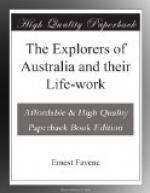The boats having been long since abandoned, it was necessary to build a raft of pine-logs wherewith to transport the baggage over the stream. They crossed in safety, and we can imagine that it was with no feelings of regret that they finally lost sight of the stream that had so persistently baffled them in all their attempts to traverse its banks.
For some days they had to struggle against the many obstacles of a new and untrodden land, but they at last emerged on to the Macquarie country, which made a pleasant and welcome contrast with the detested Lachlan.
It may be thought that too much stress has been laid upon Oxley’s opinion of the Lachlan, but it was this pessimistic report that dominated the public mind for many years in its speculations as to the character of the interior.
To Oxley himself, the first glimpse of the Macquarie came like a ray of sunshine on his harassed feelings. Was he not to reap some reward for his heroic efforts along the Lachlan, to enjoy the realisation of some of his ambition as geographical discoverer? The Macquarie seemed a favourable subject for the exercise of his talents. Would it not lead him westward to the conquest of that mysterious inland country which had hitherto guarded its secrets with an invincible obstinacy? Poor Oxley, who can help rejoicing with him in his short-lived joy? Without knowing it, he was the first of a long line of brave spirits who were doomed to lose health and life in carving their way into the heart of Australia.
As they returned homeward up the bank of the Macquarie, the river seemed to him to glitter with the bright promise of a crown of success. For almost the first time the entry in his journal has a cheery ring of hope:—
“Nothing can afford a stronger contrast than the two rivers — Lachlan and Macquarie — different in their habits, their appearance, and the source from which they derive their waters, but, above all, differing in the country bordering on them; the one constantly receiving great accession of water from four streams, and as liberally rendering fertile a great extent of country, whilst the other, from its source to its termination is constantly diffusing and diminishing the water it originally receives over low and barren deserts, creating only wet flats and uninhabitable morasses, and during its protracted and sinuous course is never indebted to a single tributary stream.”
3.3. The Liverpool plains.
The disappointment occasioned by Oxley’s return to Bathurst and his failure to trace the course of the Lachlan was in part atoned for by the high opinion he had formed of the Macquarie. A second expedition was planned, and the command again offered to the Surveyor-General.
Evans was again second, and Dr. Harris, a very able man, accompanied the party as a volunteer. Charles Fraser was botanist, but Allan Cunningham did not go. The expedition was on a slightly larger scale, there being, besides those already mentioned, twelve ordinary members, with eighteen horses and provisions for twenty-four weeks. A depot was formed at Wellington Valley, and men sent ahead to build two boats.




